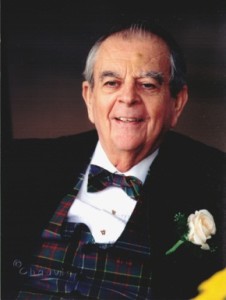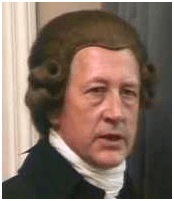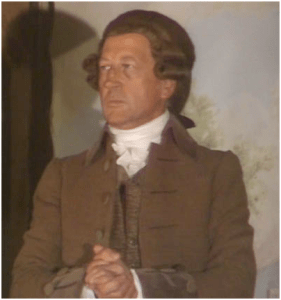Fathers in Austen-world
[Note: The following is an edited version of a post at another site in 2012]
 Good day, everyone. Father’s Day is fast approaching, so I’m going to speak of St. Patrick’s Day first. There’s a method to my madness.
Good day, everyone. Father’s Day is fast approaching, so I’m going to speak of St. Patrick’s Day first. There’s a method to my madness.
March 17th is the feast day of the patron saint of Ireland, Saint Patrick, the Roman Catholic bishop commonly acknowledged to have established Christianity in the pagan Irish hills during the fifth century. Like Saint Nicholas, he has become something else in subsequent centuries since—a legend, a symbol, and thoroughly secularized. Instead of being a day of prayer, St. Paddy’s Day has become an excuse to party. Wear the green! Shamrocks and leprechauns everywhere! Drink beer and eat corned beef and cabbage!
I don’t celebrate St. Patrick’s Day.
You may wonder why. After all, I’m a Roman Catholic whose family emigrated from Northern Ireland to the United States over two hundred years ago.
 It’s very simple. My father and namesake, John Vernon Caldwell, died on March 17, St. Patrick’s Day, 2001 after a decade-long battle with cancer. It’s not my intention to ruin St. Paddy’s Day for you, but forgive me if I won’t swill green beer and wear green-and-white beads (I am from New Orleans, after all) on the day my father entered heaven.
It’s very simple. My father and namesake, John Vernon Caldwell, died on March 17, St. Patrick’s Day, 2001 after a decade-long battle with cancer. It’s not my intention to ruin St. Paddy’s Day for you, but forgive me if I won’t swill green beer and wear green-and-white beads (I am from New Orleans, after all) on the day my father entered heaven.
I am of the firm belief that fathers are just as important to the development of a human being as mothers. Fathers are a child’s first and strongest example of what a man should be—for good or for ill. Generally, good fathers raise good children, bad fathers set bad examples for their offspring, and absent fathers harm kids in ways we are just beginning to understand.
One of Jane Austen’s strengths as a writer is that she understood this. Fathers are very important figures in all her works, and their characters and actions often drive her plots.
We’re all familiar with Mr. Bennet of Pride and Prejudice. Intelligent and sarcastic, he imparts his wit and self-confidence to Elizabeth. It is only after she faces her shortcomings in the wake of her misadventure at Hunsford that Elizabeth admits her father’s failings. In fact, it is Mr. Bennet’s selfish desire for peace and quiet that compels him to ignore Lizzy’s wise counsel and allows an uncontrollable Lydia to travel to Brighton to her near-ruin.
Bad fathers abound in Austen’s works. The overbearing and ungentlemanly General Tilney of Northanger Abbey is a terrifying bully. The foppish and irresponsible Sir Walter Elliot of Persuasion nearly destroys his family’s security. Sir John Middleton of Sense and Sensibility is more interested in sport than his children, and his brother-in-law, Mr. Thomas Palmer, is worse. Lieutenant Mr. Price of Mansfield Park is a drunken sot.
There are good fathers, as well. The Reverend Mr. Richard Morland of Northanger Abbey is one of Austen’s better clerics. Mr. Charles Musgrove (the Elder) of Persuasion seems to be an affectionate father. Mr. Henry Dashwood of Sense and Sensibility tries to protect his family, but time is not on his side, and neither is the character of his son, John. It is assumed that Mr. George Darcy was a good man, even if he reinforced the pride in his son, Fitzwilliam, and showed perhaps too much interest in his steward’s boy, Wickham.
Mr. Henry Woodhouse of Emma falls in the middle. Kindly and eccentric, he is also needy, demanding, and slightly selfish.
Sir Thomas Bertram of Mansfield Park is perhaps Austen’s most complicated and compelling father. Whatever you do, my advice is to forego 1999’s feminist abomination or 2007’s hack job. Find a copy of the 1983 BBC series starring Sylvestra Le Touzel. Or better yet, read the darn book.
 Sir Thomas is a man of his time, involved in his lands, holdings, and politics. He is “a truly anxious father,” though not outwardly affectionate, and his reserve of manner represses his children’s spirits before him. He leaves the raising of them to his wife, but she is a woman unable to fulfill her duties. The children are left to the attentions of their governess, Miss Lee, and their aunt Mrs. Norris. Yet, Sir Thomas loves his children and expects them to be good, honorable people. He scolds his heir, Tom, for his drinking, carousing, and gambling debts, which forces the baronet to sell the living he was saving for his second son, Edmund.
Sir Thomas is a man of his time, involved in his lands, holdings, and politics. He is “a truly anxious father,” though not outwardly affectionate, and his reserve of manner represses his children’s spirits before him. He leaves the raising of them to his wife, but she is a woman unable to fulfill her duties. The children are left to the attentions of their governess, Miss Lee, and their aunt Mrs. Norris. Yet, Sir Thomas loves his children and expects them to be good, honorable people. He scolds his heir, Tom, for his drinking, carousing, and gambling debts, which forces the baronet to sell the living he was saving for his second son, Edmund.
Sir Thomas takes his niece Fanny Price under his protection, but makes the mistake of deciding to raise her differently than his own children. Such words, usual for the period, may have sounded innocent to Sir Thomas, but to Aunt Norris, it was a free rein to make Fanny’s life miserable.
Sir Thomas shows his innate goodness upon his return from the West Indies. He takes an interest in Fanny and desires to make her life easier. He tries to help his nephew Midshipman William Price. In the wake of the twin disasters of Tom’s illness and Maria’s affair with Henry Crawford, Sir Thomas realizes that Fanny, his neglected niece, is the child of his heart. By the end of the book, Fanny is happily married to her beloved cousin Edmund and is clearly Sir Thomas’ favorite.
Austen has created a man who is trying to do the right thing, but he is as trapped by the conventions and expectations of the Regency period as any of her heroines. Like Fitzwilliam Darcy, he finally permits his humanity to emerge, which allows the baronet to see the mistakes he has made. Instead of hiding in his bookroom like Mr. Bennet, or giving up all responsibility for his calamity like Sir Walter, Sir Thomas labors to make things right. This is a real person, which gives Mansfield Park its power.
 Let’s compare him to Mr. Bennet. Both are clever and intelligent. Both married silly wives and both neglected their children. Both make the heroine of their novel their favored child. However, Sir Thomas never diminished his wife before his family, and when the going got rough, he rose to the occasion. Mr. Bennet does nothing except sulk.
Let’s compare him to Mr. Bennet. Both are clever and intelligent. Both married silly wives and both neglected their children. Both make the heroine of their novel their favored child. However, Sir Thomas never diminished his wife before his family, and when the going got rough, he rose to the occasion. Mr. Bennet does nothing except sulk.
The heck with Mr. Bennet! Sir Thomas is the best father in all of Austen’s canon.
In many ways, Austen’s works can be read as cautionary tales, particularly Mansfield Park. Had Sir Thomas taken an earlier hand in the raising of his children and niece, all would have ended differently. Austen knew how important fathers are not only to their sons but to their daughters. How would Maria have turned out differently if her example of a worthy man was an attentive Sir Thomas? I leave that to your imagination.
Not everyone’s father lives up to that august title. But if yours has, remember him. Give him a call, or better yet a visit. Show him the same love and thoughtfulness you showed your mother a month ago.
And to my fellow males: Remember that any guy can make a baby, but it takes a real man to be a father.
Until next time, this has been the Cajun Cheesehead Chronicles.

17 comments
Skip to comment form
Well said, Jack. Thanks for the words of wisdom and for the comparisons. I was wondering about Mansfield Park and its movies. I watched one recently and found it a little disturbing. It is my least favorite of Jane’s books.
My father has been deceased for 16 years. I often wish our relationship had been better. I have an awesome grandfather who took care of us after my parents divorced. My husband is s great dad to our girls.
Author
Be thankful for the good, strong men in your life, Patty. Your husband sounds like a great guy.
He is. Once a friend from church called him the million dollar man!
An excellent look at the fathers in Jane’s novels, Jack – all have their weaknesses which is what makes them human I suppose. I’m due to meet my own next week in Bath and am looking forward to it hugely!
Author
Enjoy Bath, Jane!
Thank you for such a wonderful post Jack. I agree with you about Sir Thomas being the best father in Jane’s novels. My father reminds me of Mr. Bennet in that he always spent off work time in his room reading unless it was time to eat or drive us somewhere. My mother ran, and still runs, her home with an iron fist. As an adult, I understand things that I did not understand before….
Author
We are all the children of our families. Thanks for commenting!
Thank you for such a thoughtful post, Jack! I appreciate your analysis of the fathers in Jane Austen and especially of Thomas Bertram, and agree with you! There is so much depth and things to consider in Mansfield Park, that it has become my favorite after P&P. My own dear father has been gone over 30 years, but I still remember him fondly on Father’s Day and many other times as well!
Author
I am sorry for your loss. I miss my dad, too.
A sly comment, Jack: to leave the effect of an involved Sir Thomas to our imaginations. We don’t have to do that, since you wrote that wonderful Variation on just that theme. (It’s one I re-read often).
This is a lovely post!\
Author
Thanks Margaret. If anyone else would like to read my VARIATIONS, the free PDF may be found at https://austenvariations.com/free-books/.
A truly lovely and eye opening post, Jack! Thank you on behalf of all the good fathers in the world. We women hope to have a helpmate in the raising of our children who are truly interested in their offspring. A good father is one who you can count on in good times and in bad, who tries his best to protect his family from harm and to put their wellbeing first. Austen’s fathers always confound me because I have always believed that JA’s father was loving and supportive of her. Why the majority of the fathers in her books are less than they should be surprises me. I know fathers’ roles were different in the early 19th century, but the innate desire to take care of your own would seem to be genetic rather than societal.
You give me a great reason to do a reread of all the novels again this summer with special attention to fathers, Jack. And Happy Father’s Day to you!!!
Author
Thank you, Rae.
Wonderful post, Jack!! Despite the wit and wisdom of P&P, Mansfield Park has long been my favorite Austen novel. Thanks for pointing me in the direction of a good film version; the two more recent attempts were lamentable at best.
I really enjoyed your analysis of the various fathers in Austen, especially Sir Thomas. I have always enjoyed seeing his turn-around and his final appreciation of Fanny.
Thanks for writing and posting this gem, Jack. Gives us some food-for-thought with Father’s Day coming up. 🙂
Warmly,
Susanne 🙂
(who is about 2/3 the way through Pemberley Ranch–what a great book!!)
Author
Thanks, Susanne. Sir Thomas’ turn-around is very well done in the 1983 production. Thank you for your kind words about PEMBERLEY RANCH. Once you’re done, try THE PLAINS OF CHALMETTE.
Thanks for your post, you’ve given me a new reason to reread Mansfield Park (as someone else also said, probably my least favorite of Austen’s novels because so many characters are difficult to like). I am sorry for your father’s passing. I also lost my dad almost 30 years now, and I do think about how important the steady influence of a good father is in any family.
Great post, Jack. I have never thought to analyze the Austen book fathers as a group.